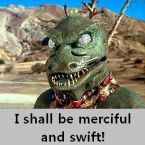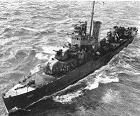Dili
Posts: 4708
Joined: 9/10/2004
Status: offline

|
quote:
ORIGINAL: warspite1
quote:
ORIGINAL: Dili
The Soviet Army was several times the German Army by the time of the Pact, unless the Soviets had a very low opinion of themselves there is not way to think that they'll risk loosing a war, or should be afraid by any reason.
Nazis army had not yet demonstrated any military superior capacity by the time of the Pact was signed.
warspite1
Well to say they should not be afraid for any reason seems a little too much. War is unpredictable at the best of times. German performance in World War I would have shown the Soviets that there was potentially every reason to fear a re-armed German Army.
But more pertinently, the Soviets knew of Japanese attempts to get the Germans to focus on the USSR rather than Britain and France. So fearing a two-front war yes, Stalin had reason to be cautious – particularly after his butchering of his own officer corps.
Finally this comment dismisses the possibility that the Soviets - like the French - were taken in by the German inflation of its armed forces size and capability. We know the truth, those at the time less so.
The French uneasiness regarding Germans was directly related to the difference in population between countries 45Millions vs 70Millions which matters with full mobilization something that did not existed for Soviets 150Millons vis Germans 70Millions
quote:
ORIGINAL: Dili
They even had just came from a victory against Japanese forces in East. https://en.wikipedia.org/wiki/Battles_of_Khalkhin_Gol
warspite1
I think you are incorrect here in terms of chronology. Have you ever wondered why the Soviets waited until the 17th to move into Eastern Poland?
By the time of the NS pact the war in the East was NOT over. The Germans expected, and urged, the Soviets to march into Eastern Poland by the 3rd September. Remember the Germans did not know the French weren't going to strike in the west and needed the Polish Campaign finished asap. But the Soviets did not do so until the 17th. Why?
The Kwantung Army’s 2nd Division was still conducting offensive operations on September 8th/9th. Large scale aerial combat was being fought in the East in the first week of September and as late as the 14th/15th September. It was only on the 15th that the Molotov-Togo Agreement was signed that brought a ceasefire into effect on the 16th. Essentially Stalin was not keen to advance – and risk a two front war – until the war in the East was decided. It is no coincidence the march into Eastern Poland happened the very next day.
It appears to be a good point, still the Soviet Army at time was much bigger than what was employed in East.
quote:
ORIGINAL: Dili
The issue here is that the West is judged morally and ethically but for Soviets is instead perfectly moral ethical they be pragmatic and self interested. That is worse than Double standards, it is inverting them.
warspite1
I’ve no idea if that comment is aimed at my comments specifically or your general impression of how the Soviet position is looked at. All I can say is I hope it’s not the former because it goes against everything I’ve said on the subject – and I reject the notion that I am exhibiting double standards if that is what you meant. In fact quite the opposite because I am not tarring Stalin just because he took action that was not in the West’s interest, just as the West sometimes took action without thought for others – including the Soviets.
History is much easier with the benefit of hindsight – but the leaders in the 1930’s didn’t have it, and they had a hugely complex, ever changing set of challenges to deal with. I don’t think the leaders of the Western powers or the Soviets acted especially morally or ethically – they acted in the interests of their country’s – as they were tasked with doing. That involves – certainly for the Western Democracies – trying to do the right thing for the right reasons, but not by any means always succeeding. Sometimes a more practical, pragmatic approach was required – and that could mean others being trampled over. All those features were in evidence for both the West and for the Soviet Union.
Sorry was not pointed at you
quote:
ORIGINAL: Dili
I have a different opinion about Communists(and other totalitarians) than you
warspite1
I am not at all sure in what way you mean this and so until I get clarity I won’t say too much. Suffice to say, I have nothing but disgust for totalitarian regimes, what they stand for and the pain and misery they caused – particularly during WWII. To suggest anything else is quite shocking and hopefully just a breakdown in communication and not what you meant to imply.
But i am not talking about workers, but instructed people, opinion makers, journalists, artists, nothing of that was unknown to them. But the "greater good" always could offset hideous crimes.
We should not forget also that most Communists murdered were probably murdered by other Communists.
this is know by themselves but many still accept it.
quote:
ORIGINAL: Dili
.....a person that is willing to give such power to an institution - in this case we might call it the unitary state without separation of power- is someone that will not be and should not be surprised by anything that comes from it. After all it has all power.
There are millions of Communists today and they can know all history.
warspite1
Sadly I think you’ve misunderstood my point. Anyone that supports Communism today has the benefit of hindsight – not just the hideous Stalinist regime, but of what life was like under more ‘enlightened’ Communist leaders. I’ve been to the DDR museum in Berlin – it is heart-breakingly sad.
But what I was referring to were people – typically the working class – back in the 1920’s and 1930’s who grew up in poverty that our generation can only read about and imagine. They had been through WWI, they’d been through the Great Depression, there were people starving. These are the sort of people that in most cases wouldn’t have even comprehended the sentence ‘unitary state without separation of power’… they just wanted a better life and Communism (where in theory everyone is equal) was a chance at that.
I am not talking about workers. see above
quote:
ORIGINAL: Dili
"historical" is the name journalists give always to people that perpetuate in power that they like, also they call them "leaders".
warspite1
Sorry but I am not sure what this means.
Just show how even today journalist language tries manipulate opinions. Franco is entitled as the "Spanish dictator" which he certainly was, but Fidel Castro for example instead is entitled the "historical Cuban leader" or just "Cuban leader". Once again different standards. One is "leader" which put that person outside any discussion and contest, the other is dictator which gives illegitimacy. Does not even have right to the "historical" tag
|
 Printable Version
Printable Version






















 New Messages
New Messages No New Messages
No New Messages Hot Topic w/ New Messages
Hot Topic w/ New Messages Hot Topic w/o New Messages
Hot Topic w/o New Messages Locked w/ New Messages
Locked w/ New Messages Locked w/o New Messages
Locked w/o New Messages Post New Thread
Post New Thread